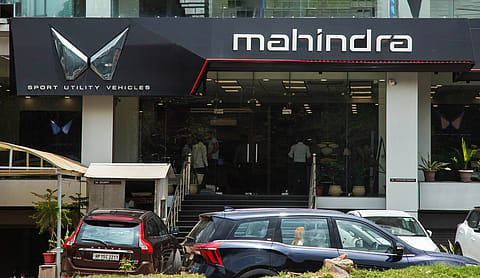M&M shares rebound nearly 2% after 6% fall on Friday; Jefferies reaffirms 'Buy' rating
Mahindra and Mahindra shares climbed 1.7% to hit an intraday high of ₹2,713.55 on the BSE. The stock is down 18% from its 52-week high of ₹3,276.30 touched on Feb 10, 2025.

Shares of Mahindra and Mahindra (M&M) rose nearly 2% on Monday, in an otherwise weak broader market, amid value buying after the auto heavyweight crashed over 6% on Friday. The counter is down nearly 18% from its 52-week high of ₹3,276.30 touched on February 10, 2025, while it is up 50% from its 52-week low of ₹1,790 hit on March 15, 2024. The auto stock has lost over 12% of its market value in the calendar year 2025, while it lost nearly 3% in the past one month.
Early today, Mahindra and Mahindra shares opened flat at ₹2,667, after ending 6.07% lower on Friday, registering its biggest single-day fall in nearly 7 months. The bluechip stock, however, gained momentum and climbed 1.7% to hit an intraday high of ₹2,713.55 on the BSE. At the time of reporting, M&M shares were trading 1.07% higher at ₹2,696.30 with a market capitalisation of ₹3.35 lakh crore.
Jefferies reaffirms 'Buy' rating to M&M
M&M shares got boost today after global Jefferies reaffirmed its 'Buy' rating to the stock, setting a target price that indicates significant upside from current levels. The brokerage house has given a price target of ₹4,075, signaling an upside potential of 52.6% from Friday’s closing level.
Analysts at Jefferies believe the recent fall in M&M shares provide a buying opportunity, as its valuation remain attractive, citing that its core FY26 estimated price-to-earnings ratio of 20x supports an 18% EPS CAGR for FY25-27.
Jefferies’ rating review comes at a time when the auto heavyweight is under severe pressure, with the stock falling nearly 18% in the past 11 sessions amidst looming concerns about Tesla's potential entry into the Indian markets and its impact on the domestic players.
The global brokerage house believes that Tesla's entry in domestic market to have a limited near-term impact on M&M, citing the price gap in their electric vehicles (EV) portfolios.
Recommended Stories
Concerns about new EV policy
The recent correction in M&M shares can also be attributed to a likely new EV policy in India. Under the new policy, it is expected that import duty will come down from 110% to 15%, which will have a negative impact on domestic original equipment manufacturer (OEMs) against imported EVs.
According to HSBC Global Research report, if new EV policy implemented, this would be an unfair policy for the incumbent Indian passenger vehicle (PV) industry as it is favourable for imported vehicles over domestic manufactured ones (ICE). “Positively though, OEMs will be allowed to import only 8k vehicles per year, which is not significant in the context of market size and even segment size ($35K+). At this small scale, it will be interesting to see how many new OEMs will enter India.”
As per the report, government of India is charging 43-50% GST on comparable ICE PVs in India (categorised under SIN tax as PVs are bought by rich and privileged people, according to the government) and on top of that a road tax of 13%. This means, total tax on domestic manufactured ICE vehicles is 55-60%. Compared to that, domestic EVs have GST of only 5% and most are exempt from the road tax as well.
(INR CR)
(DISCLAIMER: The views and opinions expressed by investment experts on fortuneindia.com are either their own or of their organisations, but not necessarily that of fortuneindia.com and its editorial team. Readers are advised to consult certified experts before taking investment decisions.)